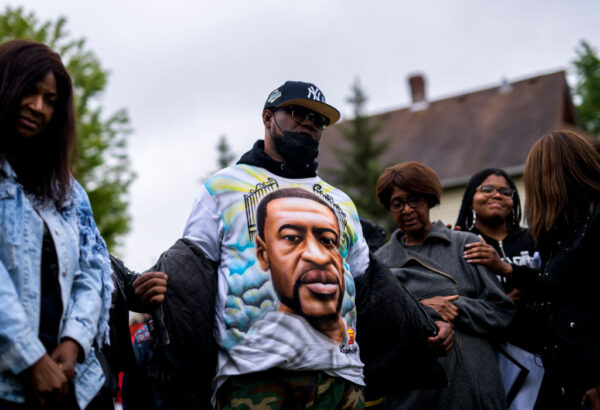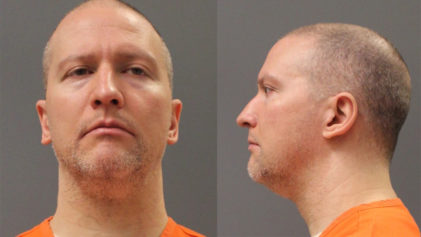On the evening of May 25, 2020, while many Americans were wrapping up their Memorial Day barbecue dinners and cleaning off the remnants of charred meat from their grills, a towering Black man cried out for his mother while he was pinned under a cop’s knee.
Minneapolis Police officer Derek Chauvin pressed his knee into the handcuffed George Floyd’s neck for over nine minutes. His last words were “They’ll kill me. They’ll kill me,” according to body camera transcripts.
“George Floyd’s murder sparked a national conversation about police violence, racism and systemic oppression,” Floyd’s family attorney Lee Merritt told Atlanta Black Star.

Floyd’s death shocked the conscience of the nation, although he wasn’t the first Black man who fatally fell victim to excessive force used by sworn officers, nor the first to be caught on video. His desperate pleas for help also weren’t new. It was part of a tragic script that has played out over and over, one where the fallen seemingly knew they were going to take their last breaths.
Now Chauvin and his attorneys have asked Minnesota’s highest court to review his second-degree murder conviction, arguing that he didn’t get a fair trial. They allege the state trial was tainted by public exposure and juror misconduct.
“We’re very hopeful that the Minnesota Supreme Court will accept review of the case,” the ex-cop’s lawyer William Mohrman told The Associated Press.
Chauvin wasn’t deterred by any of Floyd’s words or the pleas of the bystanders who voiced their concerns for the 46-year-old’s life. Reports later revealed the white cop of 19 years had a history of using his knee to restrain Black citizens. He had 18 official complaints on his record and was involved in a fatal police shooting. Chauvin was dismissed from the force the day after he brutalized Floyd in front of an audience.
A bystander’s video of the killing went viral online. The white police officer was then arrested on May 29, 2020. That weekend protests erupted city by city, leading to global demonstrations, some on home soil turned violent and destructive.
The Black Lives Matter movement imploded with protesters taking over the streets during the hot summer months. The outrage led to corporate campaigns and legislative change.
Chauvin stood trial in March 2021 and was convicted of second-degree murder that April. The Minnesota Court of Appeals upheld the conviction keeping his 22 1/2-year sentence in place, even though his lawyer argued that the judge should’ve moved the trial out of the city, and the national spotlight influenced its fairness.
Chauvin’s attorney argued in the petition to the state supreme court that one juror kept secret that he was involved in an event honoring the Rev. Martin Luther King Jr.’s March on Washington a few months after Floyd was killed. The lower court did not see the allegation of misconduct as a valid reason for a retrial.
“Police officers undoubtedly have a challenging, difficult, and sometimes dangerous job. However, no one is above the law,” appellate Judge Peter Reyes wrote in April. “When they commit a crime, they must be held accountable just as those individuals that they lawfully apprehend. The law only permits police officers to use reasonable force when effecting a lawful arrest. Chauvin crossed that line here when he used unreasonable force on Floyd.”
Regardless of if the Supreme Court invalidates the conviction, Chauvin must still serve 21 years for a separate federal civil rights charge. He is currently being housed in a federal facility in Arizona, according to AP.
The Floyd family attorney said, “Chauvin’s ill-fated appeal will ultimately fail under the current legal standards for overturning a conviction by a jury.”
“His attorneys are arguing that a change of venue should have been granted. However, a neutral judge certified a fair jury panel that reached a decision based on the evidence,” Merritt said. “It is highly unlikely that an appellate court will overturn a qualified jury without more.”
Still, after Floyd’s murder, Minneapolis has banned chokeholds and neck restraints and required cops to stop their colleagues from using excessive force. The other officers on the scene with Chauvin during the fatal encounter also faced charges. Similar policies have been enacted by local and state governments in a chain reaction to his death.
Yet, The George Floyd Justice and Policing Act, an expansive federal police reform bill, has been stalled in the Senate for the past three years.
The daylight killing also led to broader conversations about race in America. It prompted talks of reparations for Black Americans and closing the economic gaps for Black families. Corporate guilt or philanthropic desire motivated by the global movement also led to millions of dollars being pelted at minority-owned businesses, organizations and more.
However, Merritt argues that “little has been done to address the culture of policing and lack of accountability.”
Black Americans are still more likely than whites to be killed by police.
Law enforcement killed at least 1,176 people in 2022, making it the deadliest year on record since 2013, and 402 police have been killed by authorities so far, according to Mapping Police. The data shows 26 percent of those killed by police in 2022 were Black, although African-Americans only account for 13 percent of the population.
Notably, police officers still benefit from qualified immunity, a legal principle that grants them immunity from certain lawsuits.
“On balance, very little has changed to curb the deadliest police in the modern world,” Merritt said.


